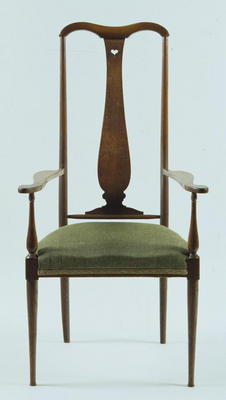
The Brussels armchair designed c 1900 by George Henry Walton (1867-1933) for Wyncroft House in Kent. The chair is part of a dining suite commissioned for the house, but the same design was used by Walton for the Kodak showroom in Brussels and exhibited in Glasgow at the 1901 International Exhibition.
Walton was the youngest of twelve children. Several of his siblings became artists including his brother E A Walton, one of the Glasgow Boys. He started out as a bank clerk, attending art evening classes. In 1888, at the age of 21, he opened a decorating business in Wellington Street having been commissioned to decorate a smoking room for one of Miss Cranston's tea rooms. His family contacts helped him win more commissions and George Walton & Co expanded, becoming a limited company in 1896.
In 1897 Walton moved to London and met George Davison (1854-1930) while working on a photographic exhibition. Davison was assistant manager of Eastman Photographic Materials Co and was appointed managing director when the company became Eastman Kodak. Through this connection Walton received commissions to design Kodak showrooms in the United Kingdom and Europe, as well as packaging for Kodak and other firms. In 1901 he accepted his first architectural commission, and from 1916 to 1921 he designed pubs and canteens for the Central Control Board, the agency set up by the Government to manage the drinks trade and public houses in many munitions production areas. Walton continued to work on a wide variety of projects after the war, including textile design.
Reference: E.1981.125.11
Reproduced with the permission of Glasgow City Council, Glasgow Museums
Keywords:
architects, armchairs, artists, Arts and Crafts Movement, Central Control Board (Liquor Traffic), designers, Eastman Kodak Co, Eastman Photographic Materials Company, furniture, George Walton & Co, Glasgow Boys, Glasgow Style, painters and decorators, Wyncroft House
You have 9 images in your photo album.